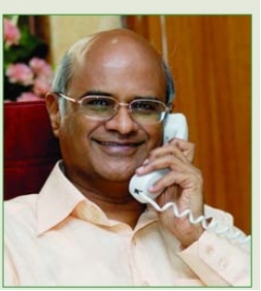
What are BSNL's main strengths?
BSNL's key strength, as an incumbent operator serving for the past 150 years, is its wide reach. We have a large number of highly skilled personnel, complete transparency in operations, a wide bouquet of telecom services, affordable tariffs and, above all, the trust of the people.
What is BSNL's telecom market share?
BSNL has a customer base of more than 67 million users. Of this, 31.9 million are mobile subscribers, 32 million are fixed line subscribers and over 3.5 million are WLL subscribers. BSNL currently has a total telecom market share of 26.1 per cent. It is the market leader in fixed line telephony; it has 42 per cent share in broadband and 28 per cent in internet, and is the overall telecom market leader.
What is BSNL's biggest challenge today?
The single biggest challenge for BSNL at present is to expand its network sufficiently to be able to meet the public's aspiration for telecom services on demand.
What is the telecom industry's biggest concern today?
The biggest challenge before the telecom industry is to meet the surging demand through the efficient use of available resources. To adopt the latest technologies, we require infrastructure, spectrum and equipment. Currently, the hottest debate is on efficient use of spectrum.
How has BSNL performed over the past one year in terms of customer additions and market share?
During 2006-07, BSNL added about 9.5 million subscribers, with mobile services accounting for the largest share. The company earned revenue of over $10 billion in 2006-07, with a profit of about $2.25 billion. In the previous year, we were among the PSUs that paid the highest dividends to the government. The overall performance in terms of customers and revenue was very satisfactory.
What is the road ahead for the company? What are the specific thrust areas?
Besides pursuing the long-term objectives of expanding fixed line, mobile and internet services, BSNL is giving a lot of thrust to broadband services. We are expanding our existing capacity base of 1 million ports to 9 million ports. We are aggressively extending broadband services to all major towns and about 50,000 villages. This will contribute significantly towards meeting the national target of 20 million broadband connections by 2010.BSNL is also pursuing wireless broadband using Wi-Max technology through twin paths – the company's internal resources and the franchise route.
Where does BSNL stand vis-Ã -vis its rivals?
BSNL, with more than 80 per cent market share in the fixed line segment, is the clear leader. It is also a leader in broadband and internet services. It is far ahead of its immediate competitor and would like to retain its leadership position in the years to come. In the mobile segment, BSNL stands at number three in the GSM space. We intend to become the leader in this segment. For this, we are planning GSM expansion and aim to offer services in every nook and corner of the country at affordable prices, as well as value-added services of global standards.BSNL is also working to introduce IPbased next-generation networks.
What are the company's rural initiatives?
BSNL is the only operator fulfilling the government's rural vision. It has provided telephones to more than 550,000 of the 600,000 villages in the country. Efforts are on to cover the remaining villages too.BSNL has already covered more than 400,000 villages using wireless CDMA technology, and plans to have umbrella coverage in the entire country by 2008. It has also covered over 200,000 villages with GSM. This year, we plan to provide GSM coverage to all villages with over 5,000 population. BSNL has already ordered 1.4 million broadband ports for use in the rural areas alone. Another 40,000 broadband ports for rural areas are expected to be added in the current financial year.
What are BSNL's 3G plans?
Mobile 3G services promise high speed data transfer, which will enhance a host of data and entertainment services. There is a huge potential for wireless broadband services which are also covered under 3G technologies. BSNL recently ordered 3Gcompliant GSM equipment. We are ready to launch 3G services after the government announces the 3G policy and 3G spectrum is allocated. BSNL also has plans to roll out Wi-Max services, initially in 1,000 blocks of the country, covering over 25,000 villages.